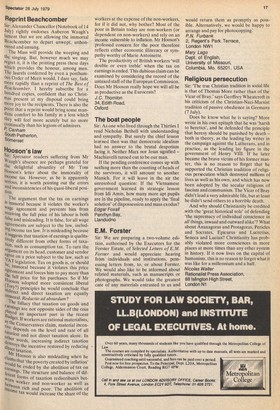Religious persecution
Sir: 'The true Christian tradition in social life is that of Thomas More rather than of the Vicar of Bray,' says Geoffrey Wheatcroft in his criticism of the Christian-Nazi-Marxist tradition of passive obedience in Germany (7 July).
Does he know what he is saying? More wrote in his own epitaph that he was 'harsh to heretics', and he defended the principle that heresy should be punished by death — both in theory, as the leading lay writer in the campaign against the Lutherans, and in practice, as the leading lay figure in the government of Henry VIII. If he later became the brave victim of his former mas ter, this is no reason to forget that he supported the Christian tradition of religi ous persecution which destroyed millions of lives as well as his own, and which has now been adopted by the secular religions of fascism and communism. The Vicar of Bray didn't lead a very admirable life, but at least he didn't send others to a horrible death.
And why should Christianity be credited with the 'great historical role' of defending 'the supremacy of individual conscience in all things, inward and outward alike'? What about Anaxagoras and Protagoras, Pericles and Socrates, Epicurus and Lucretius, Seneca and Lucian? Christianity has probably violated more consciences in more places at more times than any other system in history. If it now lives on the capital of humanism, this is no reason to forget what it was like for a millennium and a half. Nicolas Walter Rationalist Press Association, 88 Islington High Street, London Ni






































 Previous page
Previous page